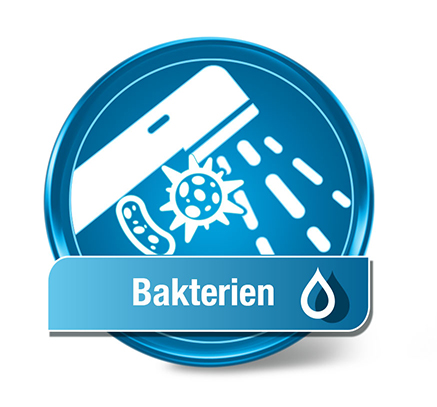
Diarrhea from Drinking Water
Diarrhea from drinking water can be the cause of years of stomach pain and migraines. Not only in wells but also in controlled tap water, previously unnoticed pathogens or heavy metals can sometimes lurk. A water test for coliform bacteria can save lives — not just for people with weakened immune systems, young children, and the elderly!
Diarrhea from Drinking Water Due to Dirty Water?
Bacteria in water are often the reason for sudden headaches, stomach pains, and vomiting. Even with the greatest hygiene, E. coli and enterococci can occur. Why do these pathogens proliferate worldwide in well water, shallow lakes, rivers, reservoirs, pools, and pipes? Are swimming animals and fertilizers to blame?
Indeed, during heavy rains and floods, animal and human fecal germs can seep into leaking pipes or covers. Germs can also settle in defective boilers, reservoirs, or pipes. Coliform bacteria also like to accumulate on water dispenser gaskets, humidifier filters, and filtration systems. Bacteria are also active in places like the moist, scaled screens of many faucets.
However, not all coliform bacteria from the digestive tract are harmful. Some are beneficial — for example, Escherichia coli produces vitamin K in the intestines. On the other hand, pathogenic strains often cause fever and inflammation in the eyes, appendix, intestines, gallbladder, urinary tract, meninges, stomach, ears, and wounds.
In severe cases, E. coli infection can even cause blood in urine or diarrhea, as well as sepsis (blood poisoning). Babies under six months risk dying from blue baby syndrome. Coliform bacteria and Legionella can also cause life-threatening pneumonia. Some strains may harm the kidneys of children and seniors or be antibiotic-resistant.
Furthermore, E. coli-contaminated groundwater or surface water (e.g., from fertilizer runoff) is suspected of damaging the liver and genetic material — especially when nitrate turns into carcinogenic nitrite. Diarrhea from drinking water particularly affects the immunocompromised, the injured, diabetics, and children.
Why Test Tap or River Water?
Home and well owners are responsible for the health of anyone using their drinking water. Water utilities in German-speaking countries rigorously test water — but only up to the house connection. After that, property owners or tenants are responsible for testing their own water regularly.
Testing for Legionella and lead limits is mandatory — and applies to wells and pools as well. Our bacterial tests are also helpful if you or pets swim in rivers or lakes, whether locally or while traveling.
Drinking water regulations in Switzerland and Germany require regular testing and compliance with heavy metal limits — including in tap water. Standing water in metal pipes can lead to elevated concentrations of lead, copper, or nickel.
How does a bacteria test work? Simply fill the supplied container with the water sample, complete the enclosed form, and send it to the lab in the provided box. We’ll perform the test quickly and reliably.
Tip: Even clear freshwater from a stream or well can contain bacteria, nitrate, and heavy metals!
Selecting the Right Drinking Water Test
We offer tailored water analysis kits for different needs:
- Opti Water Test — ideal for immunodeficiency, baby food preparation, calcified water dispensers, or suspected lead/copper pipes. Tests for aluminum, chromium, cobalt, calcium, magnesium, nitrite, sulfate, and overall water hardness.
- Ideal Water Test — for tap water analysis. Includes instructions for easy sample collection. Tests for heavy metals like aluminum, barium, iron, copper, strontium, zinc, and more. Identifies corrosion or deposits in the plumbing system.
- Bacteria Water Test — measures total germ count per milliliter and detects pathogens such as coliforms and E. coli. Recommended in case of diarrhea symptoms.
Expert tip: Avoid introducing bacteria during sampling — no touching with sponges or gloves. Regularly clean, descale, and disinfect aerators and water dispensers. Chlorinating stagnant water in pipes can also help. Public and private wells should be tested at least once per year — better twice.
The test for contaminated drinking water has been a game-changer for many. Each analysis delivers long-awaited answers. Our test kits for bacteria and heavy metals help eliminate acute and chronic illnesses. Take your chance for better health with water tests from Umweltcheck.
✔ Heavy metals and pollutants
✔ For general drinking water, softeners
✔ E. coli, coliform bacteria
✔ Enterococci
✔ Focus on bacterial contamination
✔ For general drinking water, softeners
✔ Heavy metals and contaminants
✔ Separate bacteria test recommended
✔ Analysis for lead also included
✔ Separate bacteria test recommended





